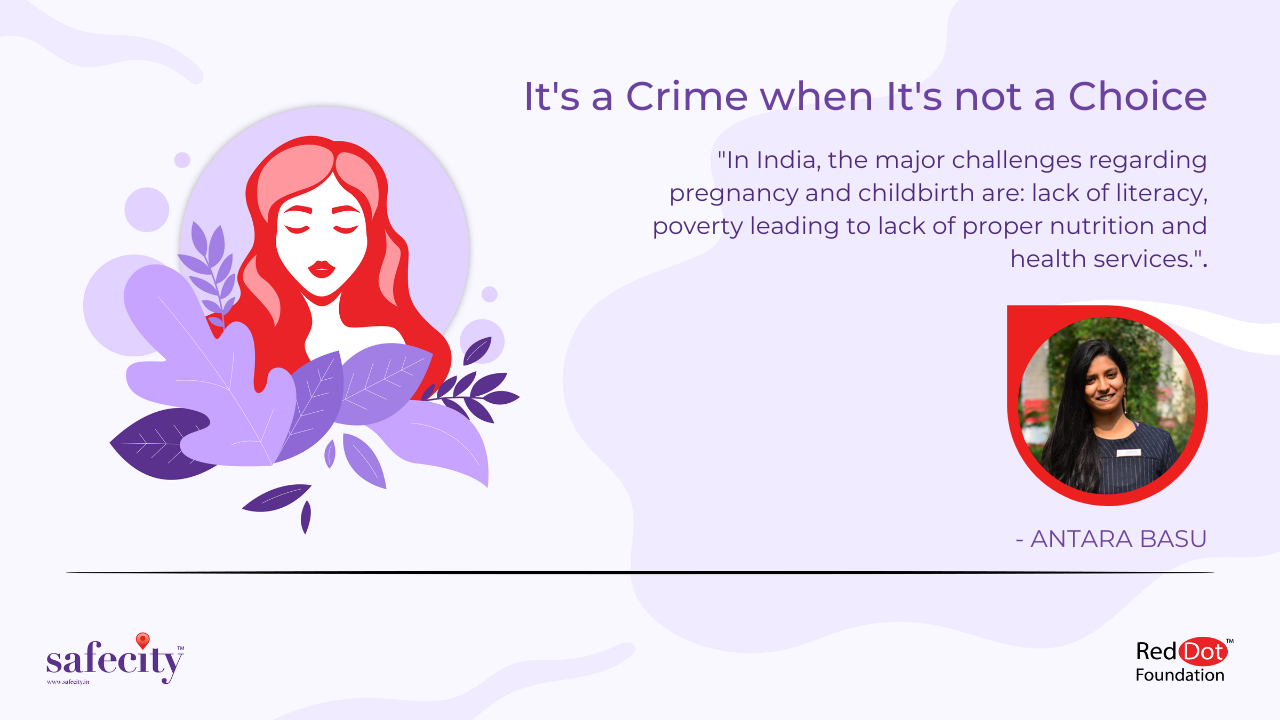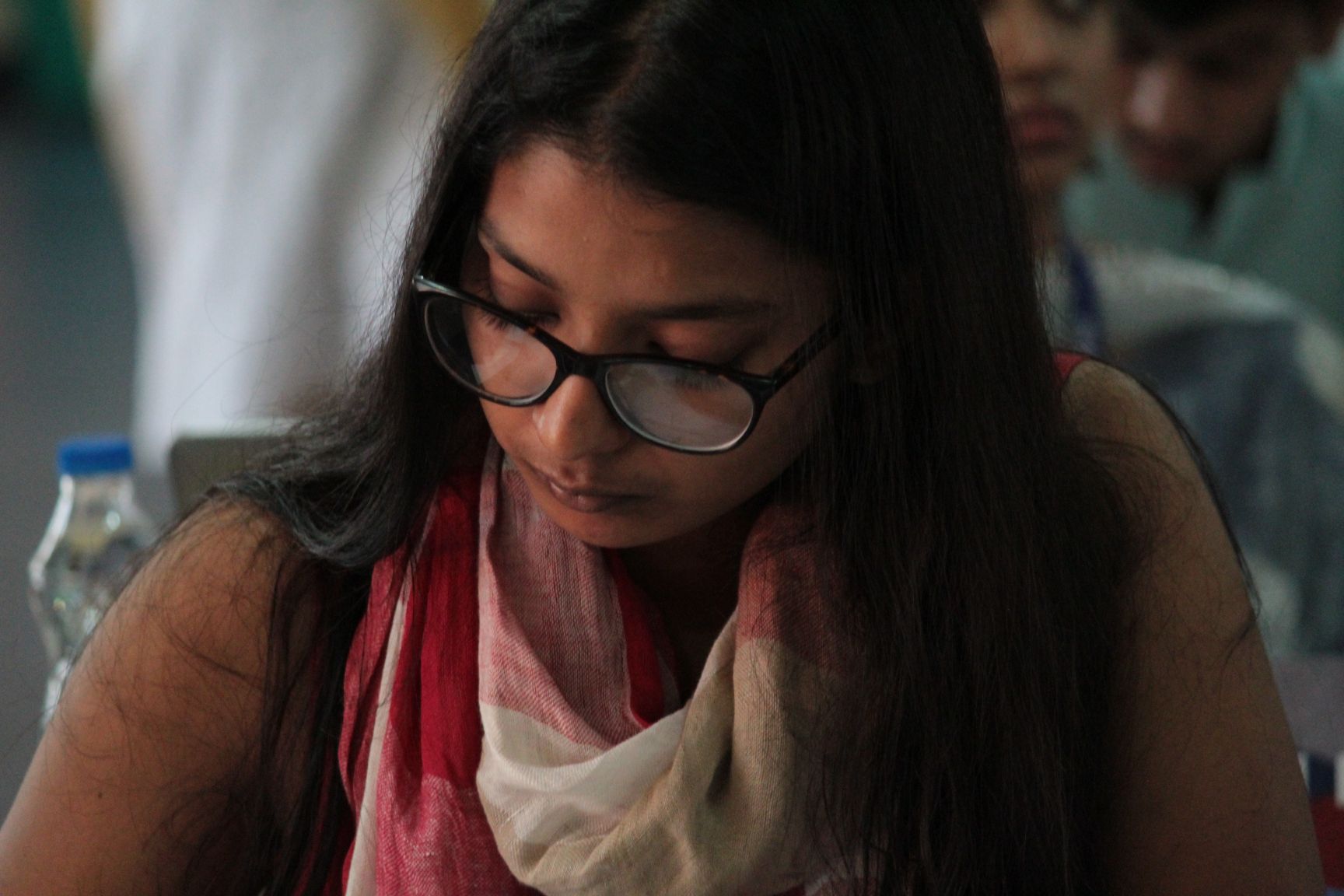It’s a Crime when It’s not a Choice

Antara Basu is a feminist writer and blogger, hanging by the thread of procrastination trying to achieve perfectionism. She is a Blogging intern with Safecity and has been with us for more than three months.
It’s a Crime when It’s not a Choice
– Antara Basu
“Defend the unborn against abortion even if they persecute you, calumniate you, set traps for you, take you to court or kill you. “
-Pope Francis
The pictures and videos on social media of crowds gathered outside women’s clinic’s to harass those who make a conscious choice to avail its services can be cited as a classic example of people shoving their personal beliefs down others throats. It is infuriating to see how people believe they have the right to legislate or even express their uncalled-for opinion to restrict a woman’s reproductive freedom. Whether it be for religious reasons or one’s own bigoted beliefs, nobody has a say in what a woman chooses to do or not do with her body. Forcing one’s beliefs – about what may seem wrong to them – on others, relating a matter of such privacy and individual choice, to put simply…is irrational.
The pro life movement which screams itself hoarse for the protection of an unborn foetus, seems to forget about a part of life that succeeds mere birth; survival. Survival in brutal socio- economic conditions or young children growing up in abusive home environments, just because every woman does not have the right to make a decision about her own body. Another fact that is often overlooked is that illegality isn’t synonymous with non existence. Henceforth, areas where such basic rights are outlawed do not witness a decline in abortions but only a continuing rise of back alley abortions which are not just dangerous but also fatal. Being pro choice doesn’t necessarily mean supporting abortions but it does mean respecting other those women to allow them to make their own choices, which perhaps may not align with yours.
A key difference between these two schools of thought isn’t the preference and non preference of life, or abortion. But simply the recognition of free choice.
Current Scenario In India :
India though, is a country fortunate enough to set in place a rather liberal and inclusive set of laws regarding reproductive rights, it doesn’t negate the community and societal disapproval or ostracization that many undergo.
As per The Medical Termination Of Pregnancy Act of 1971, abortion is legal in India. Up to 12 weeks, the opinion of one medical practitioner is required and when a pregnancy is between 12 to 20 weeks, it is mandatory to have two registered medical practitioners. A woman can seek abortion on grounds of grievous injury to mental or physical health of the woman as well as when the continuation of the pregnancy has substantial risk that the child could suffer from mental or physical disabilities.
Thus rape, incest as well as unwanted pregnancies caused by failure of contraceptives are included under the clause of anguish or risk to mental health caused by such pregnancies and therefore can be terminated legally. It also states that the pregnancy of a minor and a lunatic [which according to the Indian Lunacy Act refers to mentally disabled persons] can’t be terminated without the consent of the guardian. And no pregnancy shall be terminated without the consent of the pregnant woman.
In another win for the pro choice movement the MTP amendment bill of 2020 was approved by the union cabinet to stretch the limit for the termination of pregnancy till 24 weeks. Furthermore, it changed the failure of contraceptives clause to include any woman and her partner from only married woman and her husband.
Although, India’s maternal mortality rate has gone down by 77%, from 556 per 100,000 live births in 1990 to 130 per 100000 live births in 2016 [WHO]. In India, the major challenges regarding pregnancy and childbirth are: lack of literacy, poverty leading to lack of proper nutrition and health services. According to UNICEF India,
- Mothers and children in the lowest economic bracket have about a two and a half times higher mortality rate.
- Social norms and socio-cultural factors often affect accessibility to health care and nutrition as well as water and sanitation services and facilities in many regions.
- Families have little access to accurate and comprehensive information about healthy maternal, neonatal and child health practices, social service entitlements and how to use them. These keys to child survival include: the age of a mother at childbirth and her education level, spacing between children, gender-discriminatory child rearing practices, access to improved sanitation, drinking water quality and maternal and child nutrition.
- There aren’t enough skilled personnel and specialists in child health care, leading to a lack of demand for health services and the promotion of healthy practices and care-seeking behaviours among families.
Majorly, to improve reproductive health, neonatal conditions, maternal mortality and infant mortality rates, the main emphasis needs to be on educating women and men regarding these issues so as to empower them to make informed decisions. It becomes imperative to ensure that all legislations regarding a woman’s bodily autonomy and reproductive rights are discussed and deliberated in cabinets where women enjoy majority. Another arena which needs focus, is the termination of poverty and economic disparities. Access to family planning services and health care, proper nutrition, use of contraceptives and the necessary precautions that need to be taken care of during the prenatal period is also obstructed by lack of financial support and education as well as the propagation of conservative stereotypes and myths. Although the situation is achieving progress, we still have a long way to go until all women from all strata of society have equal access to reproductive care.
The views expressed are of writer.
Sources:

